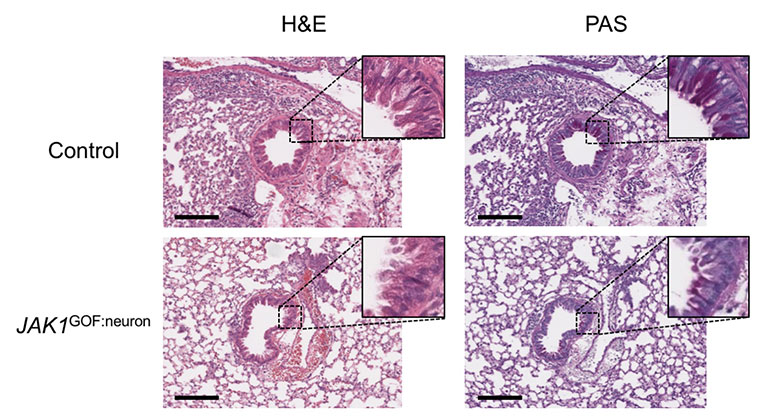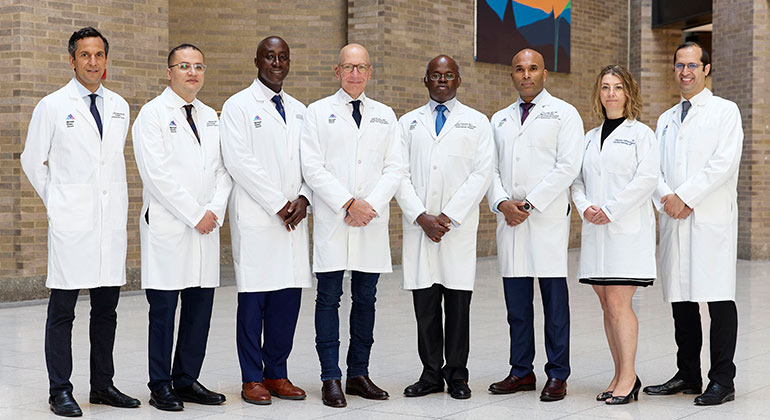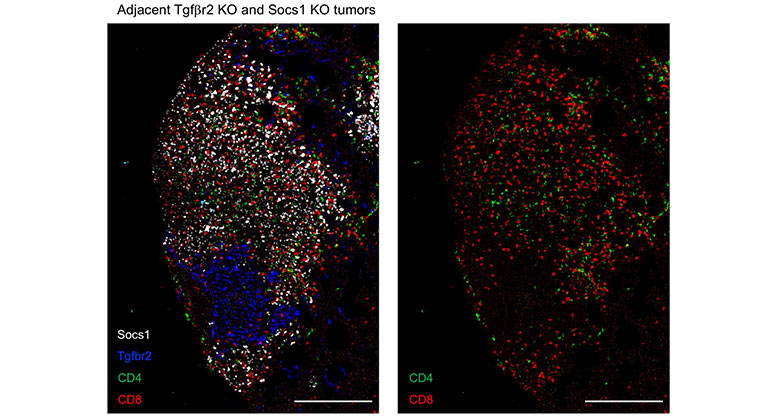Team of Scientists Demonstrate Path for Tackling Rare Cancers with No Effective Treatment
An international team of scientists led by the Icahn School of Medicine at Mount Sinai and UConn School of Medicine have reported the results of a genome sequencing study for an extremely rare form of cancer. Their findings demonstrate the utility of this approach to open the door for therapy options for rare diseases that are neglected due to scarcity of patients or lack of resources. The paper was published today by JCI Insight, a journal of the American Society for Clinical Investigation.
For this project, leading genomic scientists from Mount Sinai, UConn School of Medicine, and other global collaborating institutions performed exome sequencing on tumors and matched normal samples from 17 patients with parathyroid carcinoma, an ultra-rare form of cancer for which there is no effective treatment. When a tumor forms on one of the four small parathyroid glands located behind the thyroid, it can impact the body’s control of calcium levels in both blood and bones. Patients with this cancer, if it is not cured early by surgery, typically die from its progressive metabolic complications including very high blood calcium levels, weakened bones, and calcium-induced kidney damage.
The study combined the power of UConn’s world-renowned research expertise in parathyroid disease and other endocrine tumors with Mount Sinai’s leadership in next-generation genomic sequencing and bioinformatics analysis, along with key contributions from the global consortium they organized.
Researchers found several mutations in known cancer-related genes and pathways, including the CDC73 tumor suppressor, the PI3K/AKT/mTOR pathway, and the Wnt canonical pathway, among others. This in-depth characterization provides a clear view of genetic mechanisms involved in parathyroid carcinoma and could lead to the first therapy options for patients.
“This is the largest genomic sequencing study to date for this rare and deadly cancer, and we believe it serves as important validation for using this approach to uncover clinically relevant information in any number of neglected diseases,” said Rong Chen, senior author of the paper and Assistant Professor in the Department of Genetics and Genomic Sciences at Mount Sinai. “Genomic analysis is opening the doors to diseases that could never have been understood through traditional biomedical research because there simply aren’t enough patients to observe.”
The genetic variants identified in this study have been detected in other cancers and are the subject of ongoing basket trials, or clinical trials focused on specific mutations rather than the tissue where the cancer formed.
Mount Sinai’s use of its latest cutting-edge genomics techniques helped build upon the co-senior study author Dr. Andrew Arnold of UConn and his research team’s findings published in the New England Journal of Medicine in 2003 discovering the first gene in non-familial parathyroid cancer. Dr. Arnold’s team has a longstanding history of investigating the molecular genetic underpinnings of endocrine gland tumors, being the first to also discover cyclin D1 (PRAD1), a key regulator in multiple cancers including breast cancer, which turns out in the present study to be altered in parathyroid carcinoma as well.
“I have been involved in the care of patients with advanced parathyroid carcinoma for well over two decades, and the lack of effective anti-tumor therapy has been terribly frustrating,” says Dr. Arnold, the study’s co-leader who serves as the Murray-Heilig Chair in Molecular Medicine, Director of the Center for Molecular Medicine, and Chief of Endocrinology at UConn School of Medicine. “Some of the tumor-specific genomic vulnerabilities we found turn out to be shared with much more common cancers, so drugs already being developed for other cancers may prove valuable in parathyroid cancer. This offers new hope for our patients, and serves as a model for approaching other rare and neglected diseases.”
“As we generate and analyze large, multi-dimensional data sets from tumors, there is mounting evidence that cancer treatment may be more successful when based on specific genetic markers instead of tissue of origin,” said Eric Schadt, PhD, senior author on the paper and the Jean C. and James W. Crystal Professor of Genomics at the Icahn School of Medicine at Mount Sinai, and Founding Director of the Icahn Institute for Genomics and Multiscale Biology. “Conventional wisdom tells us that the only way to treat rare disease is to invest billions of dollars in developing new therapies. This study shows that parathyroid carcinoma may be rare but its genetic mutations are not, indicating that patients may benefit right now from treatments that are already on the market.”
The study was supported by the fund from the Icahn Institute of Genomics and Multiscale Biology at Mount Sinai and the Murray-Heilig Fund in Molecular Medicine at UConn School of Medicine through the UConn Foundation.
Paper cited:
Chetanya Pandya et al. Genomic profiling reveals mutational landscape in parathyroid carcinomas. JCI Insight. 2017;2(6):e92061. https://doi.org/10.1172/jci.insight.92061 (CK DOI)
About the Icahn School of Medicine at Mount Sinai
The Icahn School of Medicine at Mount Sinai is an international leader in medical and scientific training, biomedical research, and patient care. It is the medical school for the Mount Sinai Health System, an integrated health care system which includes seven hospitals and an expanding ambulatory network serving approximately 4 million patients per year.
The School has more than 1,800 students in MD, PhD, and Master’s programs and post-doctoral fellowships; more than 5,600 faculty members; over 2,000 residents and fellows; and 23 clinical and research institutes and 34 academic departments. It is ranked among the highest in the nation in National Institutes of Health funding per principal investigator. The School was the first medical school in the country to create a progressive admissions approach for students who seek early assurance of admission through the FlexMed program.
The Graduate School of Biomedical Science trains PhD and MD/PhD students, and offers master’s-level programs in areas such as genetic counseling, clinical research, biomedical sciences, and public health, and an online master’s degree in health care delivery leadership. The seamless connections between our medical school, graduate school, and hospital campuses provide an extraordinary environment for translating scientific discoveries into clinical treatments.
For more information, visit http://icahn.mssm.edu or find the Icahn School of Medicine at Mount Sinai on Facebook, Twitter, YouTube, and LinkedIn.
About UConn Health
UConn Health is Connecticut’s only public academic medical center. Based on a 206-acre campus in Farmington, UConn Health has a three-part mission: research, teaching and patient care.
Home to the UConn School of Medicine, School of Dental Medicine and UConn John Dempsey Hospital with over 5,500 employees supporting nearly 1,000 students, over 600,000 annual patient visits, and innovative scientific research contributing to the advancement of medicine.
For more information, visit health.uconn.edu.
About the Mount Sinai Health System
Mount Sinai Health System is one of the largest academic medical systems in the New York metro area, with more than 43,000 employees working across eight hospitals, over 400 outpatient practices, nearly 300 labs, a school of nursing, and a leading school of medicine and graduate education. Mount Sinai advances health for all people, everywhere, by taking on the most complex health care challenges of our time — discovering and applying new scientific learning and knowledge; developing safer, more effective treatments; educating the next generation of medical leaders and innovators; and supporting local communities by delivering high-quality care to all who need it.
Through the integration of its hospitals, labs, and schools, Mount Sinai offers comprehensive health care solutions from birth through geriatrics, leveraging innovative approaches such as artificial intelligence and informatics while keeping patients’ medical and emotional needs at the center of all treatment. The Health System includes approximately 7,300 primary and specialty care physicians; 13 joint-venture outpatient surgery centers throughout the five boroughs of New York City, Westchester, Long Island, and Florida; and more than 30 affiliated community health centers. We are consistently ranked by U.S. News & World Report's Best Hospitals, receiving high "Honor Roll" status, and are highly ranked: No. 1 in Geriatrics and top 20 in Cardiology/Heart Surgery, Diabetes/Endocrinology, Gastroenterology/GI Surgery, Neurology/Neurosurgery, Orthopedics, Pulmonology/Lung Surgery, Rehabilitation, and Urology. New York Eye and Ear Infirmary of Mount Sinai is ranked No. 12 in Ophthalmology. U.S. News & World Report’s “Best Children’s Hospitals” ranks Mount Sinai Kravis Children's Hospital among the country’s best in several pediatric specialties.
For more information, visit https://www.mountsinai.org or find Mount Sinai on Facebook, Twitter and YouTube.

New Insights Revealed On Tissue-Dependent Roles of JAK Signaling in Inflammation
Dec 21, 2023 View All Press Releases





